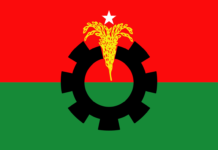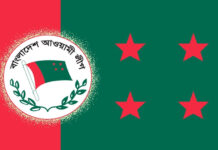Sadeq Khan
US President Obama has declared war on the ISIL (newly emerged self-styled Islamic State of Iraq and the Levant), alternatively called ISIS (Islamic State of Iraq and al-Shams, which is the Arabic term of the Levant). He and his Secretary of State have been feverishly putting together a global alliance to fight that war.
His defence Secretary, Chuck Hagel, in his testimony before the Senate Armed Services Committee has characterised this war as a generational war. That means, this 21st century War of attrition will extend for 25 to 30 years, unlike the two World Wars of the last century, notwithstanding the vastly increased power of mass destruction by unmanned robotic and long-range missile attacks.
The two World Wars exhausted the European maritime powers that dominated sea trade and embarked on their colonial drive for global supremacy from the 16th century. Allied forces in the First World War succeeded in destroying the Turkish Caliphate and Ottoman Empire. The relevant European maritime powers shared the booties of Caliphate domains. After the Second World War, they began losing their colonies, and themselves had to depend of US Marshall Plan for reconstruction and recovery from war devastation. Challenged by Russia’s Soviet empire in Eastern Europe and Eurasia, the US formed in due course the North Atlantic Treaty Organisation for defence of Western Europe under its command. After some four and half decades of Cold War with the US-led “free world” champions of the West that included post-war pacifist Japan from Asia as well, the Soviet empire collapsed, but Russia has in due course recovered as a significant world power, if not a superpower.
Exploitation of loyalties in post WWII
To exert their dominance over oil-rich Middle East and North Africa, former Ottoman domain that was predominantly Arab but potently volatile on account of tribal, ethnic and religious diversity, European maritime powers encouraged Arab nationalism and thereafter suppressed it by exploiting tribal loyalties and applying divide and rule methods. With the beginning of the Cold War, West Europe and thereafter the United States took up the agenda for implant and protection of Israel in the heart of Arab territories. US pledge of protection of Israel, right or wrong, has resulted in wide-spread antipathy to the West amongst Arab populations in that region, although the leaders of most Arab states prefer a status quo under superpower umbrella. US covert strategy of employing and arming of Islamic extremism during Cold War years to defeat Soviet power was also instrumental to the rise of al-Qaeda challenging the US-led “free world” as well as Russia and China. The al-Qaeda applied informal war tactics of suicide bombing and guerrilla attacks, both urban and rural.
At the threshold of the new millennium, USA continued Cold War tactics of tacit support to armed Islamic separatists in Russia, and also largely ignored pinpricks of Islamic militant sabotage of US interests and establishments overseas. The unusual aerial suicide attack on American changed that situation.
In the twenty-first century, emerging as the sole superpower, the USA declared its first global war on terror. It obtained UN backing, but engaged in the conduct of that war with full control and command of US-NATO authority, NATO mandate having been expanded for a global role. It has dragged on over a decade, involving US-NATO air power and ground troops, unsuccessful in eliminating al-Qaeda, but effecting successful regime changes in Afghanistan, and replicating similar regime change in Iraq. Paradoxically, that regime change made way for a foothold for al-Qaeda in Iraq, until then denied that access by the “iron hand” of the secular, welfare regime of ousted Saddam (the same thing has happened in Libya after the ouster of Gaddafi by Obama’s air power only “policy for regime change” in the name of march of democracy and Arab spring).
Obama’s outlandish strategy
Now the Iraqi al-Qaeda has separated from Al-Qaeda mainstream to change informal war tactics and become regular warriors, taking paradoxically again the advantage of armed offensive of dissidents and “Sunni” volunteers in Syria backed by money and arsenal of US-NATO powers and their Arab allies. US-NATO avowed purpose, backed by their allies in the Arab League who suspended Syria, was a regime change as in Libya. Russia put its foot down and there was a stalemate in the Syrian theatre. The regime, militarily well equipped, show strong resilience and significant domestic support. The Iraqi al-Qaeda has meanwhile acquired booties of several oil fields in Syria and Iraq, and occupied vast tracts of land, elbowing out or enforcing the subservience of other rebel groups in Syria, coming right upto the Golan Heights on the Syrian side of the ceasefire line with Israel, pushing out UN peace keepers as well.
The ISIL provoked and provided USA with casus belli by video broadcast on the web of executions slitting the throats of two American journalists and one British aid-worker in avowed retaliation of US aerial bombing and British arming of Kurdish ground offensive against ISIL positions in Iraq. The execution of non-combatants and the manner of their killing provoked strong condemnation from the Iranian President also. But in gathering its war allies, USA has carefully avoided Iran (and of course Syria where it still pursues the goal of regime change). USA secured the participation of Arab League allies in the region providing recruits for war on the ground, money and logistic support (lives of US or European troops would not be risked), and of NATO members for aerial strikes, and arms supplies to Kurds, Iraqi government forces fighting ISIL, as well as to Syrian ‘moderate’ rebels fighting Syrian regime, Turkey chose to provide NATO air bases on its soil and humanitarian services. Iran’s President Rouhani pooh-poohed the US move branding the US-led coalition as “ridiculous”: “If they want to use planes and if they want to use unmanned planes so that nobody is injured from the Americans, is it really possible to fight terrorism without any hardship, without any sacrifice? In all regional and international issues, the victorious one is the one who is ready to do sacrifice.” The Iranian president declared unilateral military backing for Iraq if ISIL crosses the “redline”: “When we say the red line we mean the red line. It means we will not allow Baghdad to be occupied by the terrorists or the religious sites such as Karbala or Najaf be occupied by the terrorists.”
Washington’s second global war
Thus, after its first global war of the 21st century under President Bush, USA under President Obama, the Nobel Laureate for Peace has embarked on a it’s second global war on a self-styled Islamic state with its own territorial definition unlike al-Qaeda. By its own admission, US expects it to be a generational war, unlike the World Wars of the last century and more like the War of Roses in the 15th century that destroyed a whole generation of dynastic power-players. As the two world in the 20th century changed the World Wars order radically, finally establishing the UN system that we are part of today, “a generational war” led by US-NATO alliance with an exclusive agenda may result in radical changes in that system.
Already, under the sanctions regime imposed by the US-NATO leadership on Iran over its “suspect” nuclear energy programme, and on Russia over its alleged “involvement” in Ukrainian civil war, coercion is beginning to have contrary effects. As Enrico Fels, analyst at the Germany-based Center for Global Studies of the University of Bonn, in a commentary observed, the Sanghai Cooperation Organisation, unnoticed by the western media, is sowing the seeds of an alternative warder. The two-day forum of the 13th annual summit of the Shanghai Cooperation Organization (SCO) on September 12-13 in Tajikistan’s capital Dushanbe was attended by regional leaders, including Russian President Vladimir Putin, and his Chinese and Iranian counterparts, Xi Jinping and Hassan Rouhani.
The SCO is an intergovernmental organization of Central Asian countries aiming to promote cooperation between its six member states: Russia, China, Kazakhstan, Uzbekistan, Kyrgyzstan and Tajikistan. Topping the agenda were plans to expand the alliance: India, Pakistan, Iran and Mongolia, all countries with observer status. Should this happen, the group would then control 20 percent of the world’s oil and half of all global gas reserves. On top of that, the bloc would represent about half of the world’s population.
Emergence of new grouping
While Moscow feels threatened by the expansion of NATO and the European Union on its western border, China – the world’s largest exporter of goods and one of the largest importers of raw materials – is highly dependent on its ports. Beijing is under pressure in the east from the United States and its regional allies, Japan and the Philippines. Given the outside pressure exerted on both countries they feel they must get along in Central Asia. Stability in the region is also key to protect Russian and Chinese economic interests. Both countries depend on a functioning infrastructure, such as pipelines and railways. China not only imports gas and oil from Russia and Central Asia, but it is also the largest supplier of goods in the region.
What links all SCO states – whether members or observers – is the rejection of Western-dominated institutions, be it the United Nations, World Bank or the International Monetary Fund, which are all US-based. The SCO, like the BRICS with the establishment of their Development Bank, sees itself as a forum against the existing global order. In May, China and Russia signed a deal to build one of the largest ports in northeast Asia on Russia’s Sea of Japan coast. In August the two countries agreed to set up a special logistics centre which will allow to sell fruit and vegetables directly to Russia to offset any negative effect of the Russian food embargo on agricultural products from EU, USA, Australia, Norway, Canada, in response to sanctions imposed by the West on Russia.
Soft & hard power balance
On September 1 Russian President Vladimir Putin and Chinese Vice Premier Zhang Gaoli launched the construction of the first part of Gazprom’s ‘Power of Siberia’ pipeline. It follows a historic gas deal signed in May which will provide the world’s fastest growing economy with 4 trillion cubic meters of natural gas it needs to keep pace for the next 30 years. Russia confirmed on September 10 it is planning to join forces with China and create an alternative to the international banking transaction system SWIFT (Society for Worldwide Interbank Financial Telecommunications).
The profound changes that are thus taking place in soft and hard power balancers in the flux of geopolitical order around the world need to be closely watched by the developing world and particularly by small countries with large populations like ourselves. Bangladesh is very much vulnerable both politically and economically to any stress of geopolitical disorder. Our collective choices and national inclinations of 20th century past, particularly of Cold War inheritance, may not help us much in facing upto the situations arising. It is particularly important that our younger generation keep open their minds as well as their eyes, and watch their steps.
Source: Weekly Holiday









